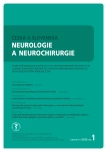Landau- Kleffner Syndrome and Long‑term Adrenocorticotropic Hormone Therapy – a Case Report
Authors:
L. Švecová; P. Sýkora; M. Kolníková
Authors‘ workplace:
Klinika detskej neurológie LF UK a DFNsP Bratislava
Published in:
Cesk Slov Neurol N 2015; 78/111(1): 93-97
Category:
Case Report
doi:
https://doi.org/10.14735/amcsnn201593
Overview
The electrical status epilepticus in slow sleep (ESES) is characterised by specific EEG pattern of paroxysmal activity significantly activated during slow sleep. There are more clinical variants associated with an EEG pattern of ESES (for example Landau-Kleffner syndrome, continuous spike and wave syndrome – CSWS, benign childhood epilepsy with centro-temporal spikes, atypical benign partial epilepsy of childhood, myoclonic-astatic epilepsy). Therapy of ESES syndrome is not limited just to seizure control but it should be focused on controlling neuropsychological outcome through improved continuous epileptiform activity. Even though the epileptic seizures and the EEG pattern of ESES are age-related, many children have persisting cognitive and language disturbances. Early diagnosis and effective treatment are necessary for better outcome in these patients. In our case report we present the good effect of long-term adrenocorticotropic hormone therapy.
Key words:
electrical status epilepticus in slow wave sleep – cognitive deterioration – adrenocorticotropic hormone
The authors declare they have no potential conflicts of interest concerning drugs, products, or services used in the study.
The Editorial Board declares that the manuscript met the ICMJE “uniform requirements” for biomedical papers.
Sources
1. Tassinari CA, Rubboli G, Volpi L, Meletti S, d’Orsi G, Franca M et al. Encephalopathy with electrical status epilepticus during slow sleep or ESES syndrome including the acquired aphasia. Clin Neurophysiol 2000; 111(Suppl 2): S94 – S102.
2. Scholtes FB, Hendriks MP, Renier WO. Cognitive deterioration and electrical status epilepticus during slow sleep. Epilepsy Behav 2005; 6(2): 167 – 173.
3. De Negri M. Electrical status epilepticus during sleep (ESES). Different clinical syndromes: towards a unifying view? Brain Dev 1997; 19(7): 447 – 451.
4. Inutsuka M, Kobayashi K, Oka M, Hattori J, Ohtsuka Y. Treatment of epilepsy with electrical status epilepticus during slow wave sleep and its related disorders. Brain Dev 2006; 28(5): 281 – 286.
5. Francois D, Roberts J, Hess S, Probst L, Eksioglu Y. Medical management with Diazepam for electrical status epilepticus during slow wave sleep in children. Pediatr Neurol 2014; 50(3): 238 – 242. doi: 10.1016/ j.pediatrneurol.2013.11.002.
6. Chen XQ, Yhang WN, Yang ZX, Zhao M., Cai FC, Huang SP et al. Efficacy of levetiracetam in electrical status epilepticus during sleep of children: a multicenter experience. Pediatr Neurol 2014; 50(3): 234 – 239. doi: 10.1016/ j.pediatrneurol.2013.10.015.
7. Kramer U, Sagi L, Golberg ‑ Stern H, Zelnik N, Nissenkorn A, Ben ‑ Zeev B. Clinical spectrum and medical treatment of children wth electrical status epilepticus is sleep (ESES). Epilepsia 2009; 50(6): 1517 – 1524. doi: 10.1111/ j.1528 – 1167.2008.01891.x.
8. Guerrini R, Genton P, Bureau, Parmeggiani A, Salas ‑ Puig X, Santucci M et al. Multilobar polymicrogyria, intractable drop attacks seizures, and sleep‑related electrical status eppilepticus. Neurology 1998; 51(2): 504 – 512.
9. Mikati MA, Saab R, Fayad MN, Choueiri RN. Efficacy of intravenous immunoglobulin in Landau ‑ Kleffner syndrome. Pediatr Neurol 2002; 26(4): 298 – 300.
10. Nikanorova M, Miranda M.J, Atkins M, Sahlholdt L. Ketogenic diet in treatment of refractory continuous spikes and waves during slow sleep. Epilepsia 2009; 50(5): 1127 – 1130. doi: 10.1111/ j.1528 – 1167.2008.01958.x.
11. Park ID. The effects of vagus nerve stimulation on patients with intractable seizures and either Landau ‑ Kleffner syndrome or autism. Epilepsy Behav 2003; 4(3): 286 – 290.
12. Loddenkemper T, Comso G, Kotagal P, Haut J, Klaas P, Gupta A et al. Epilepsy surgery in children with electrical status epilepticus in sleep. Neurosurgery 2009; 64(2): 327 – 337. doi: 10.1227/ 01.NEU.0000336767.14252.76.
13. Buzatu M, Bulteau C, Altuzarra C, Dulac O, Van Bogeart P. Corticosteroids as treatment of epileptic syndromes with continuous spike ‑ waves during slow sleep. Epilepsia 2009; 50 (Suppl 7): 58 – 72. doi: 10.1111/ j.1528 – 1167.2009.02224.x.
14. Tsuru T, Mori M, Mizuguchi M, Momoi MY. Effects of high‑dose intravenous corticosteroid therapy in Landau ‑ Kleffner syndrome. Pediatr Neurol 2000; 22(2): 145 – 147.
15. Smith MC, Hoeppner TJ. Epileptic encephalopathy of late childhood: Landau ‑ Kleffner syndrome and the syndrome of continuous spikes and waves during slow ‑ wave sleep. J Clin Neurophysiol 2003; 20(6): 462 – 472.
16. Lerman P, Lerman ‑ Sagie T, Kivity S. Effect of early corticosteroid therapy for Landau ‑ Kleffner syndrome. Dev Med Child Neurol 1991; 33(3): 257 – 260.
Labels
Paediatric neurology Neurosurgery NeurologyArticle was published in
Czech and Slovak Neurology and Neurosurgery

2015 Issue 1
- Advances in the Treatment of Myasthenia Gravis on the Horizon
- Memantine in Dementia Therapy – Current Findings and Possible Future Applications
- Memantine Eases Daily Life for Patients and Caregivers
-
All articles in this issue
- Autoimmune Encephalitis
- Asymptomatic Spondylotic Cervical Cord Compression
- Protocol of Diagnostic and Treatment of Hyponatremia and Hypernatremia in Neurocritical Care
- Validation of the Czech Version of the Neuropathic Pain Symptom Inventory (NPSIcz)
- Mini‑Mental State Examination – Czech Normative Study
- Surgical Treatment Algorithm for Multiple Myeloma and Solitary Plasmacytoma of the Spine
- Inter-individual Variability in Processing of the Sémont Liberatory Manoeuvre
- Neuromyelitis Optica Spectrum Disorders – Retrospective Analysis of Clinical and Paraclinical Findings
- Normative Data for the New Test of Odour Pleasantness in Healthy Participants
- Neurostimulation, Neuromodulation and Neurotization in the Therapy of Neurogenic Bladder
- Surgically Difficult‑ to‑ Treat Meningiomas
- Landau- Kleffner Syndrome and Long‑term Adrenocorticotropic Hormone Therapy – a Case Report
- Czech and Slovak Neurology and Neurosurgery
- Journal archive
- Current issue
- About the journal
Most read in this issue
- Protocol of Diagnostic and Treatment of Hyponatremia and Hypernatremia in Neurocritical Care
- Mini‑Mental State Examination – Czech Normative Study
- Autoimmune Encephalitis
- Asymptomatic Spondylotic Cervical Cord Compression
